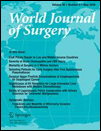Post-Hospital Discharge Venous Thromboembolism in Colorectal Surgery
Presented as a poster of distinction presentation: The American Society of Colon and Rectal Surgeons Meeting, Boston, MA, May 30–June 3, 2015.
Abstract
Background
There are limited data regarding the criteria for prophylactic treatment of venous thromboembolism (VTE) after hospital discharge. We sought to identify risk factors of post-hospital discharge VTE events following colorectal surgery.
Methods
The NSQIP database was utilized to examine patients developed VTE after hospital discharge following colorectal surgery during 2005–2013. Multivariate analysis using logistic regression was performed to quantify risk factors of VTE after discharge.
Results
We evaluated a total of 219,477 patients underwent colorectal resections. The overall incidence of VTE was 2.1 % (4556). 33.8 % (1541) of all VTE events occurred after hospital discharge. The length of postoperative hospitalization had a strong association with post-discharge VTE, with the highest risk in patients who were hospitalized for more than 1 week after operation (AOR 9.08, P < 0.01). Other factors associated with post-discharge VTE included chronic steroid use (AOR 1.81, P < 0.01), stage 4 colorectal cancer (AOR 1.40, P = 0.03), obesity (AOR 1.37, P < 0.01), age >70 (AOR 1.21, P = 0.04), and open surgery (AOR 1.36, P < 0.01). Patients who were hospitalized for more than 1 week after an open colorectal resections had a 12 times higher risk of post-discharge VTE event compared to patients hospitalized less than 4 days after a laparoscopic resection (AOR 12.34, P < 0.01).
Conclusions
VTE is uncommon following colorectal resections; however, a significant proportion occurs after patients are discharged from the hospital (33.8 %). The length of postoperative hospitalization appears to have a strong association with post-discharge VTE. High-risk patients may benefit from continued VTE prophylaxis after discharge.




